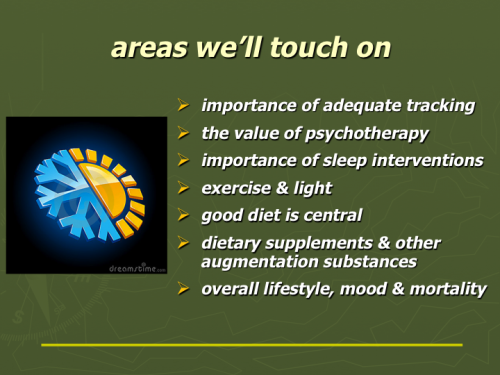Non-drug treatments for bipolar disorder (1st post) - the value of psychotherapy
Last updated on 21st April 2016
I am due to give a talk for the Lothian branch of "Bipolar Scotland" on "Recent research on non-drug treatments for bipolar disorder". Here is the downloadable Powerpoint presentation (with pictures removed to reduce the size of the file) and here is a slide illustrating the main points that I touch on:

I'm a big believer in the usefulness of tracking changes in disorder severity, especially if one is exploring whether a new intervention is helpful or not. There are a whole series of ways of doing this and Bipolar Scotland have a helpful booklet on "Mood monitoring" where they introduce the "Beam mood chart" and the "10-stage mood scale" (downloadable from the Bipolar UK website). Unsurprisingly one can also chart digitally on computer, tablet or phone - see, as an example, the "DBSA wellness tracker" provided by the US "Depression and Bipolar Support Alliance".
As a general comment, the various interview & self-report methods of assessing bipolar disorder can be a bit confusing at times - see Miller et al's 2009 overview "Assessment tools for adult bipolar disorder". In our excellent, but overstretched, UK National Health Service I wouldn't assume that good quality tracking of mood state is going to be initiated by relevant health professionals - which makes self-management even more important. Be cautious with current general mobile apps for bipolar disorder as many are not well based on most recent guidelines - see last year's "Mobile apps for bipolar disorder: a systematic review of features and content quality". Overall it makes great sense for bipolar sufferers to find & use mood monitoring tools - for example, see "Saving time and money: a validation of the self ratings on the prospective NIMH life-chart method (NIMH-LCM)".
So what about recent research on non-drug treatments for bipolar disorder? Note these approaches are not meant to be a substitute for standard, well prescribed, well monitored medication. These non-drug & healthy lifestyle approaches however are likely to be crucially important both for boosting overall treatment benefits and for reducing the broader costs of a bipolar diagnosis, including the very concerning increased mortality rates - see last year's paper "Life expectancy in bipolar disorder". Note though that better care can improve this situation considerably, so Crump et al - "Comorbidities and mortality in bipolar disorder" - reported "Patients with bipolar disorder died prematurely from multiple causes, including cardiovascular disease, diabetes, COPD, influenza or pneumonia, unintentional injuries, and suicide. However, chronic disease mortality among those with more timely medical diagnosis approached that of the general population, suggesting that better provision of primary medical care may effectively reduce premature mortality among persons with bipolar disorder."
And psychotherapy can have a very definite part to play too, so the 2016 paper "Psychological interventions for adults with bipolar disorder: systematic review and meta-analysis" commented on the need for more & better quality studies, but concluded "There is evidence that psychological interventions are effective for people with bipolar disorder ... Further research should identify the most effective (and cost-effective) interventions for each phase of this disorder." This reinforced Swartz & Swanson's 2014 "Psychotherapy for bipolar disorder in adults: a review of the evidence" conclusion that "bipolar disorder-specific psychotherapies, when added to medication for the treatment of bipolar disorder, consistently show advantages over medication alone on measures of symptom burden and risk of relapse. Whether delivered in a group or individual format, those who receive bipolar disorder-specific psychotherapy fare better than those who do not". Last year van der Voort et al's paper "Collaborative care for patients with bipolar disorder: randomised controlled trial" also underlined that "When compared with treatment as usual, collaborative care substantially reduced the time participants with bipolar disorder experienced depressive symptoms. Also, depressive symptom severity decreased significantly." And as the slide below illustrates there are developments in optimising combined therapy outcome, the value of psychoeducation, the importance of full functional recovery, better personalisation of therapy, use of internet-delivered therapy, recognising the value of treating comorbid conditions such as anxiety, and the frequent potential relevance of earlier traumatic life experience.

As they say "What's not to like?". Well effective forms of psychotherapy for the various phases of bipolar disorder are still very much under development. There's a dearth of available therapists with experience in this area. And just experience isn't at all enough - some therapists are a lot more helpful than others and this is more about human, interpersonal qualities than qualifications & training - see the blog post "Truly excellent therapists have 'grace under interpersonal pressure'" for more on this and last year's paper "Psychological treatments for early psychosis can be beneficial or harmful, depending on the therapeutic alliance" to illustrate this point's relevance across the range of severe mental disorders.
For the second part of this talk click on "Non-drug treatments for bipolar disorder (2nd post) - sleep, light & exercise".

Great talk to our group last
Submitted by David (not verified) on Fri, 08/04/2016 - 13:05.
Great talk to our group last night, James! You presented a wide-range of complex, but relevant information on bipolar disorder treatments in such an accessible way. We are a sceptical lot, but your combined background in medicine and psychology gives you significant credibility when talking about treatment options. We all learnt a lot and you deserve credit for being able to answer all the questions fired at you!
Many thanks.
Great Talk To Our Group Last Night
Submitted by James (not verified) on Mon, 11/04/2016 - 04:01.
Great pleasure, David ... thanks for writing. James